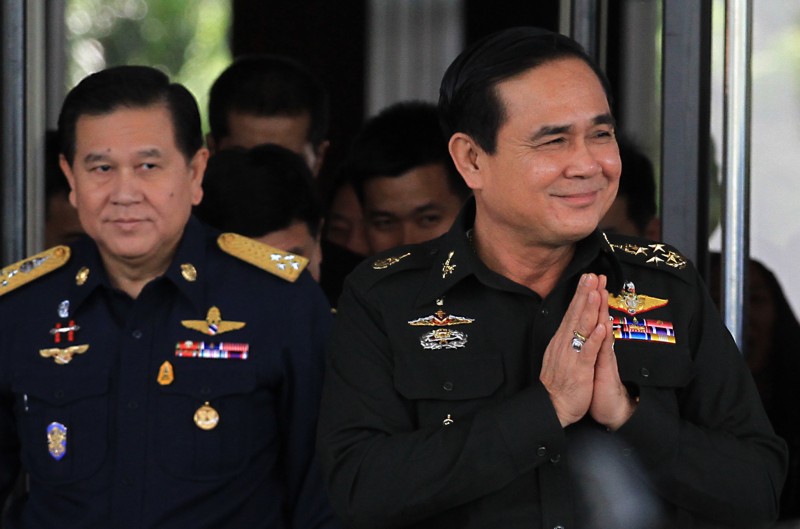
File photo of General Prayuth Chan-ocha, the incumbent Prime Minister of Thailand. Prayuth signed a new security law to replace martial law in the country. Photo by Vichan Poti, Copyright @Demotix (9/4/2014)
After eleven months, the Thailand government finally lifted martial law in the country on April 1, 2015; but it quickly signed a new security law which some human rights groups described as even more repressive.
Thailand’s army launched a coup last May, purportedly to end the street clashes between opposition and pro-government forces. It imposed martial law, controlled the newsrooms of major media stations, and banned political gatherings. An interim constitution was drafted which led to the establishment of a military-backed civilian government led by General Prayuth Chan-ocha. The new government is known as the National Council of Peace and Order. But martial law remained in effect despite the appointment of civilian authorities.
Invoking article 44 of the interim constitution, Prayuth signed Order Number 3/2558 (3/2015) which repealed martial law but imposed harsher security measures across the country. The new order provides for the appointment of “peace and order maintenance officers” from the ranks of the military who are delegated with sweeping powers to defend the security of the state. These army personnel can search homes, summon and arrest troublemakers, confiscate properties, and detain suspected individuals in special premises for up to seven days even without judicial authority.
Freedom of assembly is still curtailed as stated in article 12 of the order which bans “political gatherings of five or more persons”.
These cartoons by @stephffart reflect the sentiment of many activists and democracy advocates in Thailand with regard to article 44:
MAD JUNTAX – Fury road to Democracy ( or not ) – cartoon 2 pic.twitter.com/4z2cxxud0a
— stephff art (@stephffart) April 4, 2015
Cartoon for the Nation ‘s monday – Prayut Max 3 pic.twitter.com/OS2M8BaFW9
— stephff art (@stephffart) April 4, 2015
The order is also a threat to free speech. Article 5 of the order could be used to stifle dissent. The provision reads:
Peacekeeping Officers are empowered to issue orders prohibiting the propagation of any item of news or the sale or distribution of any book or publication or material likely to cause public alarm or which contains false information likely to cause public misunderstanding to the detriment of national security or public order. (Unofficial translation by iLaw, the Freedom of Expression Documentation Center)
Reacting to this provision, the country’s media giants represented by the Thai Journalists Association, National Press Council of Thailand, Thai Broadcasting Journalists Association, and News Broadcasting Council of Thailand banded together and issued a statement which criticized the article as “the greater threat to press freedom and freedom of expression than the lifted Martial Law.”
They urged the NCPO to clarify the intent of the article and provide a more specific definition of “national security threat” and “dissemination of false information.”
Without any clear definition of national security threat, cause of public alarm and dissemination of false information, the authorities might over-exercise or abuse their power, which is very contradicting to the NCPO order.
They also warned that this particular provision would affect millions of Internet users:
Civilians are also at risk, as people who communicates and discusses topics through online social media that contain information viewed by the authorities as threat to national security, cause of public alarm, spreading of false information or public misunderstanding will be punished on the same condition.
Referring to the same article, the Southeast Asian Press Alliance asked:
What is the criteria for determining if the content in question ’causes alarm’ or is ‘false information likely to cause public misunderstanding’? If the content in question is true and factual, can truth be a defense against such a prohibition?
UN High Commissioner for Human Rights Zeid Ra'ad Al Hussein was more direct when he assailed the NCPO’s new order as a measure that would ‘annihilate freedom of expression’ in Thailand. He added:
Normally I would warmly welcome the lifting of martial law, but I am alarmed at the decision to replace martial law with something even more draconian, which bestows unlimited powers on the current Prime Minister without any judicial oversight at all.
News about the lifting of martial law in Thailand was initially met with skepticism since it was announced on April Fools’ Day. But the Thai junta was clearly not joking when it passed a more brutal law to replace martial law.








11 comments